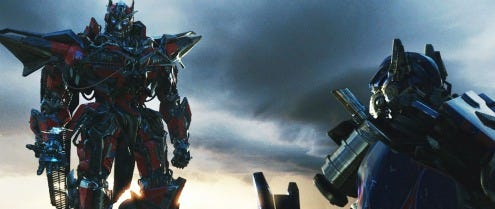Transformers: Dark of the Moon

Before I commence thrashing "Transformers: Dark of the Moon," I have to acquiesce to a few certain facts.
In a technical sense, this is the best film of the series. Detached from any and all context, the end battle, which encompasses about an hour of screen time, is a brilliant piece of cinema. If you were a casual fan of the Transformers, or are looking for mindless summertime booms, bangs and bombs, you will likely not be disappointed.
Acquiescence complete.
More than either of the other "Transformers" films, "Dark of the Moon" demonstrates director Michael Bay's fundamental lack of understanding about the franchise and its characters. His continued gift of overkill in all facets of the film has ultimately cheated a generation of fans from something they've sought for more than 20 years.
But let me back up a touch. I was 7 years old in 1984 when "Transformers" debuted as a daytime cartoon. I had two TV loves at that age: "Transformers" and "G.I. Joe." Those two series had something very simple in common: They were a simple story of good vs. evil. GI Joe battled Cobra, and the heroic Autobots battled the evil Decepticons.
More specifically, at the heart of "Transformers" was a simple rivalry: Optimus Prime vs. Megatron, the leaders of their respective factions, battling for the fate of Earth.
It stands to reason, then, that the film franchise would continue that rivalry. But Bay had other ideas, throwing in a replacement villain in the second film (the Fallen), and, in "Moon," a replacement hero of sorts in the guise of Sentinel Prime (voice of Leonard Nimoy), Optimus' mentor and predecessor as leader of the Autobots.
The other characters are easily paired up: Ironhide and Starscream correspond; Bumblebee could be matched with Soundwave or one of the other characters. But none of them are, and again the old criticism against the slipshod, random and generic nature of the film's conflicts continues. The cartoon series understood these rivalries well, and there were the occasional direct faceoffs, with the ultimate showdown pitting Prime against Megatron.
But Bay's real protagonists, in this film more than any other, are members of the military. I understand Hollywood's need for a human protagonist, but that's what Sam Witwicky (Shia LeBeouf) is for. Do we need humans taking down Decepticons, especially the big-time characters we're supposed to regard as the Big Bads?
But Bay still refuses to acknowledge the Transformers as actual characters. At best, they're caricatures. At worst, they're giant mechanical things at which soldiers can shoot. Even Prime himself is little more than a symbol to rally the troops. Yes, he gets a final battle, but it's not even close to what it should have been.
Please understand that because I don't want to spoil the movie too much, I can't divulge certain vital plot points. Suffice it to say there's a finality to this film. It has the feel of a franchise closer, as major characters don't survive.
And as a franchise closer, it is completely unsatisfying in the sense that characters are not given the proper closure to their arcs. Rivalries set up in the first film and put off in the second are not resolved in the third or are rushed to their conclusion. (And when I say rushed, I mean in mere seconds).
I'm not even taking into account in my review Bay's prior shenanigans. LeBeouf spends the first half of the film screaming uncontrollably at everyone in sight; Sam's parents return for more pointless "comedy";and we continue to get stereotypes and generalizations for the Autobots, along with quizzical mixtures. (What good does it do for a Robot in Disguise to disguise oneself as a NASCAR if you're not around other NASCARs?). This time we get Italian and Irish stereotypes, as if Bay were self-consciously trying to prove he has nothing against the black folks he lampooned in the previous film because he can tease white people as well.
I would hope you get my drift with my thoughts on this film; "DOTM" is at the same time a far superior film to "Transformers: Revenge of the Fallen," and one that does so much completely and totally wrong. I consider it Bay's signature failure, the ultimate example of style over substance — two hours and 15 minutes of expecting audiences to marvel at Bay reflecting a mirror in the sunlight.
I've said it once, twice, and now thrice: Michael Bay raped my childhood.


